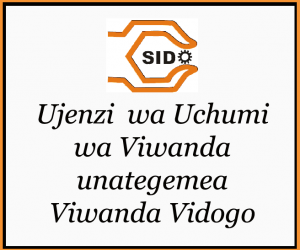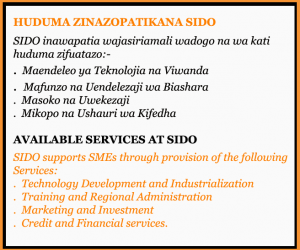Training Catalog
Training Catalog consist of different packages of trainings and their descriptions, if you want to find more information concerning a certain type of training, this training catalog can provide relevant information on such kind of training starting with its contents, Approach/Methodology, Specific Clients Targeted, Programme Fee and Duration of Course.
Objective:
To tan hides/skins into leather with proper utilization of available raw materials(hides/skins).
Modules:
- Module Name:Leather Tanning TechnologyModule Details:1.Introduction on Hides and Skins. 2.Definition and composition of skins/hides. 3.Sources and uses of skins. 4.Good treatment of skins from live animal to slaughtering in abattoir. 5.Preservation Method. 6. Storage quality and defects. 7.Grading. 8.Preparation of working tools. 9.Preparation of lime liquor. 10.Different methods used during tanning. 11. Testing if bating is successfully. 12. Introduction of tan yard. 13. Fining yard-fat liquoring ,setting out, drying ,staking, glazing and round selection. 14. Trouble shooting. 15.Environmental issues.
Approach/Methodology:
Mixture of participatory method of training and Group discussions and intensive practical exercise.
Leather stakeholders,entrepreneurs who are willing to establish industriesin the leather sector and existing entrepreneurs who are in the line with the leather related products.
Programme Fee:
TZS 300,000/= per participant (fees,food and stationeries)
Duration of the Course:
3 weeks
Objective:
To transform plain Cotton Fabric into decorative textile materials which are marketable and competitive,to transfer knowledge and techniques of making batik tie and dye and to enable participants to establish their own enterprises /Industries.
Modules:
- Module Name:Tie and Dye makingModule Details:1.Meaning of Tie & Dye /Batik. 2.The studies /lecture on Batik Tie & Dye. 3.Different types and ways of making Batik tie &Dye. 4.Practical exercise on how to make Batik. 5.Designing of Batik. 6.Industrial safety and layout.
Approach/Methodology:
Use of participatory techniques,theoretical studies/lectures,use of games and study tour to the Batik tie &dye making enterprises.
Start Up and existing.
Programme Fee:
TZS 300,000/= per participant (fees,food and stationeries)
Duration of the Course:
3 weeks
Objective:
To enable targeted participants/ clients to acquire knowledge/skills of making both bar soap and liquid soap,to enable clients to establish their own Industries/Enterprises and to enable clients to produce both marketable and competitive Soap.
Modules:
- Module Name:Soap MakingModule Details:1.Meaning of soap 2.Soap Making raw materials. 3.Types of soap making 4.Production Process. 5.Soap Cost and Pricing; 6.Special Soaps. 7.Industrial Layout and Safety.
Approach/Methodology:
Theoretical Studies/Lecture,Practical exercises,Game,Brain Storming,Study tour and Case Stories.
Start Up and existing.
Programme Fee:
TZs 250,000 per participant (fees, food and stationeries)
Duration of the Course:
1 week
Objective:
Targeted participants will be able to make Candles and establish their own enterprises.
Modules:
- Module Name:Candle MakingModule Details:1.The meaning of candles. 2.Types of wax (basic). 3. Advantages and disadvantages of the types of wax mentioned above. 4. Apparatus/utensils needed for candle making. 5. How candles are made (theoretical and practical skills). 6.Packaging process of candles.
Approach/Methodology:
Structured learning experience,Theoretical Studies/lectures,Practical Exercises and Games.
Start Up
Programme Fee:
TZs 50,000 per participants(fees,food and stationeries)
Duration of the Course:
1 week
Objective:
Enabling timber dealers who include carpenters,whole sellers,saw millers to acquire skill on drying timber to a moisture range appropriate to condition and purpose for which the timber is to be used.Sensitizing SMEs,to use seasoned timber for products quality improvement and expand/sustain their market share.
Modules:
- Module Name:Timber ProcessingModule Details:1.Forms of moisture. 2. What happens. 3. Why wood must be dried before use. 4. Moisture content. 5. Moisture content of timber in use. 6.Methods of Drying. 7.Degrading During Drying. 8.Air Drying. 9.Roofs. 10.Protection for the end of timber. 11. Timber to stock. 12.Cost of air drying.
Approach/Methodology:
Based on Forest Industries Training Institute(FITI) Module,the training will be tailored according to needs.Training will be participatory ,group and plenary discussions,practical training,exercises and sharing experiences and sharing experiences.
Representative from SMEs in carpentry,saw milling,timber trading,builders etc.
Programme Fee:
TZs 100,000 participants (fees, food and stationeries)
Duration of the Course:
1 week
Objective:
To enable salt producers to acquire appropriate technical skills on salt production.
Modules:
- Module Name:Salt ProcessingModule Details:1.Selection and preparation of Salt Farms. 2.Salt Processing. 3.Salt drying and harvesting. 4.Salt Iodization. 5.Packaging and Storage.
Approach/Methodology:
Brainstorming,Lectures,group discussion and presentation,theory and field practical.
Start up salt processors.
Programme Fee:
TZs. 100,000 per participant(fees,food and stationeries)
Duration of the Course:
2 weeks
Objective:
Target clients will be able to use ICT equipment for the purpose of business growth and competitiveness.
Modules:
- Module Name:Introduction to ICTModule Details:1.ICT devices and its uses 2.ICT and business 3.Information Search 4.E.mail services 5.Record keeping and retrieval
Approach/Methodology:
Practical Demonstaration
Pre start ups,start up and Existing Micro,Small and Medium Enterprises
Programme Fee:
TZs. 100,000 per participant(fees,food and stationeries)
Duration of the Course:
3 days
Objective:
To enable self help groups of small and medium and medium scale processors increase farm income through enhancing and promoting appropriate processing technologies.
Modules:
- Module Name:Cashewnuts ProcessingModule Details:1.Machines operation and maintenance. 2.Shelling Process. 3.Baking Processing. 4.Packaging and Storage.
Approach/Methodology:
Practical demonstration.
Individuals and Groups who are interested in cashewnuts processing.
Programme Fee:
TZs150,000 per participants (fees,food and stationeries)
Duration of the Course:
1 week
Objective:
To enable participants explain the basic principles on fruits and vegetables processing and making of various products,quality assurance ,costing and pricing and construction of solar dryer.
Modules:
- Module Name:Fruits and vegetables processing.Module Details:1.Principles of food processing. 2.Main methods of preservation of fruits and vegetables. 3.Food hygiene and food safety. 4.Food quality and standards. 5.Processing/preservation of various products.(5 products). 6.Packaging and labelling. 7.Costing and pricing. 8.Plant layout. 9.Construction of a simple solar dryer e.g. NRI - Kawanda dryer
Approach/Methodology:
Brainstorming, lectures,group discussion and presentation,theory and field practical.
Individuals/Entrepreneurs wanting to invest in fruits&vegetables processing.
Programme Fee:
TZs. 500,000 per participants (fees,food and stationeries)
Duration of the Course:
2 weeks
Objective:
To enable participants understand and explain beekeeping techniques,extraction and processing of honey and bees wax,ensuring quality of products and understanding market access requirements.
Modules:
- Module Name:Honey and Beeswax ProcessingModule Details:1.Basics of bee keeping. 2.Honey harvesting and processing. 3.Quality assurance for honey and beeswax. 4.HACCP in the honey industry. Traceability and bar codes.
Approach/Methodology:
Practicing SMEs in agro-processing, including food handlers/centres.
Programme Fee:
TZs 200,000 participants(fees,food and stationeries)
Duration of the Course:
1 week


